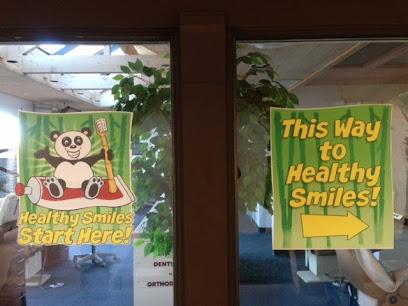
Doctor Angelo Vasquez is a unique kind of dentist. With his kid-oriented style and fun personality, he gets children excited about their dental care, helping them develop healthy habits that will last a lifetime.
Dr. Angelo Vasquez is a graduate of Santa Clara University with a Bachelor of Science degree in Combined Sciences. While earning his doctorate from the University of California, San Francisco School of Dentistry, Dr. Vasquez learned he particularly enjoyed helping children develop healthy smiles. This led him to complete a two-year pediatric specialty program at Rady Childrens Hospital, San Diego; earning status as a specialist in pediatric dentistry.
His continuing advanced studies in pediatric dentistry, especially in the areas of child behavior management and sedation dentistry, enable Dr. Vasquez to provide comprehensive childrens dental care. But most importantly, he takes the time to get to know each child personally, communicating with parents and children to create a lifetime of great smiles. Besides his professionalism, Dr. Vasquez is compassionate and committed to making his patients as comfortable as possible.
Why are baby teeth important for my child? Primary or baby teeth are important for many reasons. Not only do they help children speak clearly and chew naturally, they also assist in forming a path that permanent teeth can follow when they are ready to erupt. It is also important to start introducing your child to good oral hygiene habits and regular dental check-ups when they are young to insure a long life with good oral health.
First visit by first birthday sums it up. Your child should visit a pediatric dentist when the first tooth comes in. The American Academy of Pediatrics recommend bringing your child within 6 months of the appearance of their first tooth, or no later than his or her first birthday.
Children should be weaned from the bottle at 12-14 months of age.Encourage your child to drink from a cup as they approach their first birthday. Children should not fall asleep with a bottle containing anything but water. At-will nighttime breast-feeding should be avoided after the first primary (baby) teeth begin to erupt. Drinking juice from a bottle should be avoided. When juice is offered, it should be in a cup. Take your child to a pediatric dentist regularly to have his/her teeth and gums checked. The first dental visit should be scheduled by your childs first birthday.
Parents should take their children to the dentist regularly, beginning with the eruption of the first tooth. Then, the dentist can recommend a specific program of brushing, flossing, and other treatments for parents to supervise and teach to their children. These home treatments when combined with smart dietary choices can create a lifetime of healthy habits.
Thumb and pacifier sucking habits will generally only become a problem if they continue for a very long period of time. Most children stop these habits on their own, but if they are still sucking their thumbs or fingers when the permanent teeth arrive, your pediatric dentist may be able to help. Advice from the dentist coupled with support from the parents will usually contribute to successful cessation of the habit. If these efforts are ineffective, however, your pediatric dentist may prescribe an in-the-mouth appliance that can restrict the habit for a certain amount of time.
Fluoridated toothpaste should be introduced when a child is 2-3 years of age. Prior to that, parents should clean the childs teeth with water and a soft-bristled toothbrush. When toothpaste is used after age 2-3, the child should be supervised to make sure the child uses no more than a small, pea-sized amount on the brush. Children should spit out and not swallow excess toothpaste after brushing.
There is very little risk in dental X-rays. We are especially careful to limit the amount of radiation to which children are exposed. Our office uses lead aprons and digital X-ray sensors which require even less radiation than traditional film.
We all know that candy is not good for the teeth, but we also encourage parents to limit the amount of sweet liquids that your child drinks including juices and sport drinks. Although milk is healthy, we want parents to be careful with how much time their children spend drinking milk. A glass with a meal is great, but going to bed or wandering around the house for long periods of time with a bottle or sippy cup is not healthy for your childs teeth. Also, consider reducing the consumption of carbohydrates like crackers, cookies, chips and of course candy that can stick to your childs teeth. We encourage eating fresh fruits, vegetables, cheese and drinking water for healthy, between meal snack foods.
Beginning January 1, 2007 California requires proof of having obtained an oral health assessment by a dentist for children entering public school for in either kindergarten or first grade to present by May 31st of the first school year. Our office provides complimentary oral health assessments that fulfill the school requirements.